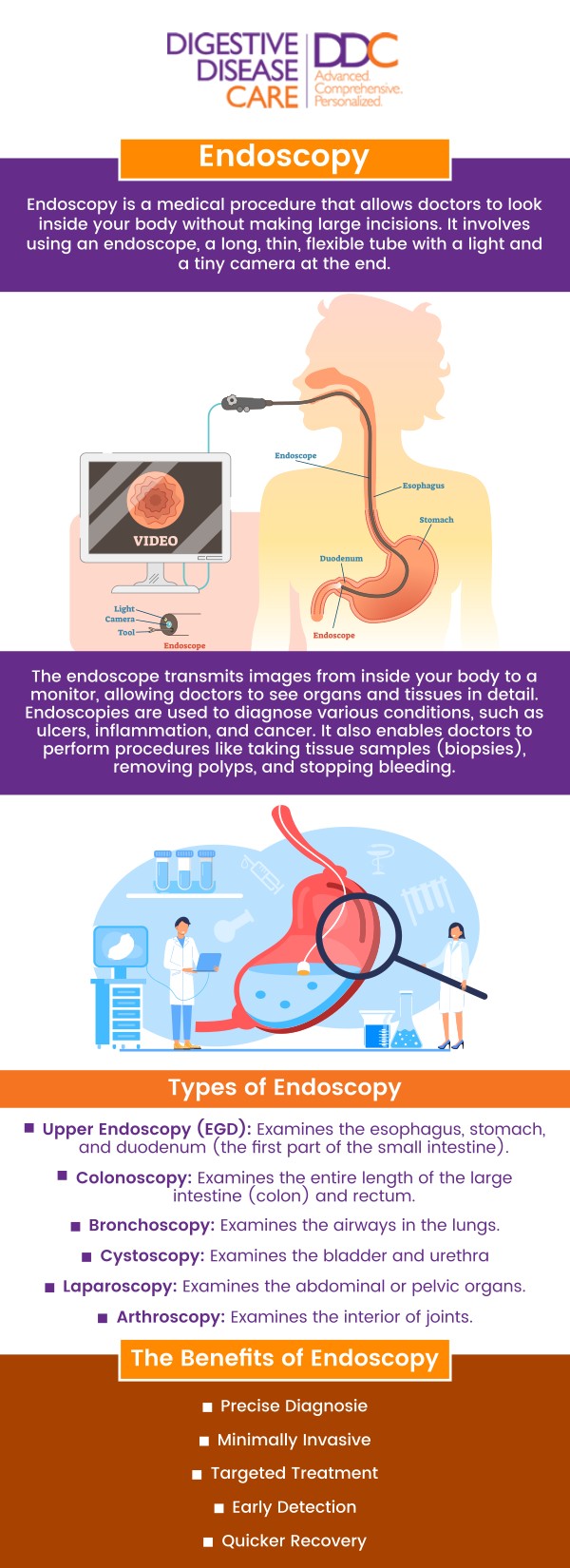Top Endoscopy Specialist in Babylon, NY
Endoscopies are a minimally invasive approach often employed in order to pinpoint the underlying causes of digestive issues and related symptoms. In some instances, they can also serve as a means to treat certain problems. Get comprehensive and specialized diagnosis and treatment by board-certified gastroenterologists at Digestive Disease Care (DDC). For more information, contact us today or schedule an appointment online. We are conveniently located at 373 W Main St, Babylon, NY 11702.




Table of Contents:
What is an endoscopy?
Why do I need an endoscopy?
Is an endoscopy safe?
Who performs an endoscopy?
An endoscopy is a medical procedure designed to provide a visual examination of the interior of the body. This involves the use of a lengthy and slender tube known as an endoscope, equipped with a miniature camera, which is inserted through a natural opening in the body, such as the mouth.
Most endoscopes are thin, hollow tubes that feature an illuminating light at their tip. Some advanced endoscopes are also equipped with a small video camera that transmits images onto a computer screen.
Endoscopies are typically named based on the specific organ or structure they are intended to investigate or treat. For instance, an upper endoscopy involves gently passing the endoscope through the mouth and throat to reach the esophagus, permitting the medical professional to observe the esophagus, stomach, and the upper section of the small intestine. Similarly, endoscopes can be introduced into the large intestine via the rectum to examine this portion of the intestinal tract. Given their versatility, endoscopies serve as a valuable diagnostic tool for investigating various systems within the human body.
Your gastroenterologist may recommend undergoing an endoscopy procedure for either your upper or lower GI tract based on your specific symptoms and digestive concerns.
Endoscopies are a minimally invasive approach often employed in order to pinpoint the underlying causes of digestive issues and related symptoms. In some instances, they can also serve as a means to treat certain problems.
There are two common types of endoscopies, those being an upper endoscopy, which examines the upper portion of the digestive tract encompassing the esophagus, stomach, and the upper part of the small intestine, and a lower GI endoscopy, which explores the lower half of the GI tract.
An endoscopy is a versatile tool used to identify the origins of gastrointestinal bleeding, diagnose and manage ulcers in the stomach or small intestine, and even detect and treat chronic inflammatory bowel diseases (IBD) such as Crohn’s disease or ulcerative colitis, among other medical purposes.
In general, an endoscopy is considered a very safe medical procedure; however, like any medical intervention, it does come with a few potential risks.
An endoscopy is a minimally invasive outpatient procedure that involves the use of an endoscope, a small fiber-optic instrument equipped with lights, and a camera to provide images of your GI tract to your gastroenterologist.
To minimize discomfort as the endoscope is inserted, you will typically receive a mild sedative or a topical spray. The sedative can affect your reflexes and judgment, even if you feel well, so it’s advisable not to plan any significant activities immediately following the procedure.
Additionally, arranging for a friend or family member to drive you home and provide post-procedure care is recommended.
Some of the minor risks associated with endoscopies include potential bleeding from polyp removal or tissue sampling, the risk of infection, the possibility of a tear in the intestinal wall, and the potential for an abnormal reaction to sedatives.
Although it is a minimally invasive procedure, there is a brief preparatory period and a mild recovery phase, typically lasting around 24 hours post-procedure.
Endoscopies can serve both diagnostic and therapeutic purposes, enabling the detection of various medical issues and providing treatments for numerous gastrointestinal problems.
An endoscopy is typically conducted by a medical professional who specializes in gastrointestinal disorders, known as a gastroenterologist. They utilize endoscopies as a diagnostic and occasionally therapeutic tool for conditions that impact the digestive system. Endoscopies are highly effective and safe procedures when performed by gastrointestinal specialists such as those at Digestive Disease Care (DDC).
Top endoscopy specialists are available at Digestive Disease Care (DDC). We have convenient locations to serve you in Melville NY, New Hyde Park NY, Forest Hills NY, Jericho NY, Mineola NY, Lake Success NY, Babylon NY, East Setauket NY, Massapequa NY, Riverhead NY and BEYOND.

Check Out Our 5 Star Reviews


Additional Services You May Like

Additional Services You May Like
- Abdominal Pain
- Acid Reflux
- Barretts Esophagus
- Bloating
- Capsule Endoscopy
- Celiac Disease
- Colon Cancer Screening
- Colonoscopy
- Constipation
- Crohns Disease
- Diarrhea
- Diverticulitis
- Esophageal PH Monitoring
- Fatty Liver
- Fibroscan
- Gallstones
- Gastroenterologist
- Gastric Chest Pain
- Gluten Intolerance
- Hemorrhoid
- Hemorrhoid Banding
- Hepatitis
- Irritable Bowel Syndrome
- Lactose Intolerance
- Pancreatitis
- Polyps
- Rectal Bleeding
- Stomach
- Ulcerative Colitis
- GI Urgent Care





